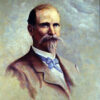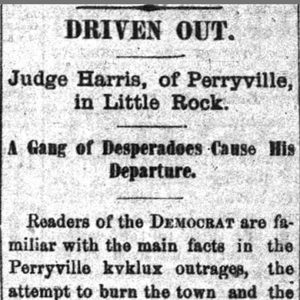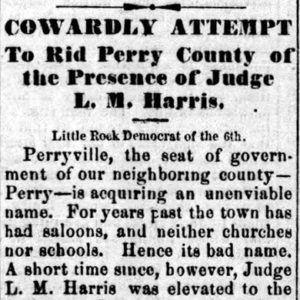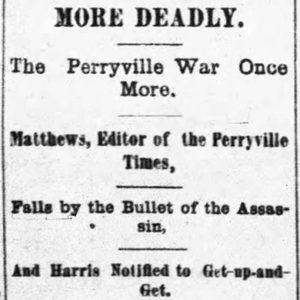calsfoundation@cals.org
Perry County War of 1881
The Perry County War is the common name given to a brief period of violence that erupted in Perryville (Perry County) in the summer of 1881. The general lawlessness, including the murder of the local newspaper editor, resulted in the governor sending the militia to calm the situation. In actuality, the 1881 events were a second eruption of an ongoing settling of political differences in Perry County dating back to the Civil War.
Like many counties in Arkansas during the Civil War, Perry County was divided by conflicting loyalties. The mountainous western sections of the county aligned with the Union, while whites in the eastern half, where most of the enslaved people lived, held Confederate sympathies. These philosophical differences continued after the Civil War, often erupting into political violence, as was the case in the summer of 1881.
One of the major political players in Perry County during these tumultuous years was John L. W. Mathews, who identified himself alternately as a Republican and Democrat throughout his life. Mathews, a native of Tennessee, moved to Arkansas before the Civil War and mustered into service with the Third Arkansas Cavalry (US) in Lewisburg (Conway County) in October 1864. After the war, Mathews moved back to Lewisburg, where he opened a hotel. In December 1868, violence aimed at African Americans by the Ku Klux Klan (KKK) roiled Conway County to such an extent that Governor Powell Clayton imposed martial law and sent the state militia to Lewisburg.
During the violence, Mathews’s hotel and other buildings in Lewisburg were destroyed by fire, although the cause could not be attributed to the KKK or any other specific group. Mathews, however, believed that the fire was the work of the Klan and the Democrats, and he attempted to avenge his loss. In mid-December, Mathews and his men stopped Robert Perry and Joe Jackson on a road outside of Lewisburg and interrogated them as to their knowledge of the Klan. The situation quickly became deadly, with Mathews’s men shooting off Perry’s ear and killing Jackson. The group marched on to the home of Thomas Hooper, a member of the Klan, to arrest him in connection with an earlier murder of Wash Lewis. Lewis, a black man, had been killed in early December, supposedly for living with a white woman. Later, Hooper’s body was discovered on the road to Springfield (Conway County), then the county seat. Mathews returned to Lewisburg to arrest three prominent Democrats but was rebuffed by a group of citizens. Thwarted, Mathews and his men returned to Springfield. By 1872, Mathews had moved to Perryville, the seat of Perry County.
During the fall of 1872, Mathews, who was identified as a Republican in the statewide newspaper during this time, was involved in the case of County Clerk George W. Manes, a fellow Republican. Manes had been arrested, along with the county sheriff, in the murder of Dallas Lillard during an ambush in July of that year, and Mathews was tapped to serve as prosecuting attorney for the case. While there was not enough evidence to send the case to trial, Manes later accused Mathews of conspiracy to murder him while he was in custody and publicly blamed Mathews for the death of Lillard. Mathews was arrested but was not tried in court.
The animosity became so pronounced that Governor Ozro A. Hadley ordered General Daniel P. Upham to Perryville to ascertain the climate. In his report to Hadley in late September 1872, Upham stated that he did not believe that politics were the root of the problem. He noted that the general desire of the county was for peace, but the disturbances could be traced to a “few bad men…in constant fear of each other.” The environment settled down after Manes was voted out of office at the November election.
Around 1880, Mathews established the Fourche Valley Times newspaper, for which he was editor and publisher.
On May 25, 1881, County Judge L. M. Harris, who was a Democrat, and Mathews—who declared himself a Republican at this time—received threatening letters, signed by the Ku Klux Klan, warning them to leave the county in fifteen days or be murdered. Five days later, the offices of the newspaper were set on fire, although it was extinguished before any major damage occurred.
On June 8, a group of armed men rode into Perryville looking for Harris and Mathews. Harris, who was holding court at the time, fled to Morrilton (Conway County). From Morrilton, the judge took the train to Little Rock (Pulaski County) and appealed to Governor Thomas J. Churchill for military help. Mathews, however, did not leave Perryville, and it was reported that, even though he greeted the band of armed men, he was not accosted. According to newspaper accounts, the troubles arose after many incidents of Harris angering certain citizens.
One of these incidents involved Harris accusing Green Smyers and James Isom, both former sheriffs of Perry County, of embezzling tax revenues. Mathews wrote editorials on the matter in the Fourche Valley Times and was considered by many to be a supporter of the judge. While some voiced support for Harris in the statewide newspapers, Mathews was almost universally reviled in the papers. One Perry County resident alluded to Mathews’s unscrupulous behavior toward his fellow citizens during Reconstruction. According to the unidentified man, Mathews illegally acquired the land on which “New Perryville” (about a mile from Old Perryville) and the county courthouse were located. While Mathews profited from the sale of this land, others suffered loss. Others accused Mathews of being an opportunist and using his newspaper to further his ambition, switching parties and his support of local politicians to benefit himself, while offending people on both ends of the political spectrum. It is apparent from the newspaper accounts that Mathews was despised and distrusted in the county.
Gov. Churchill was averse to sending the militia to Perry County and hoped that the troubles could be quelled through the law. To assist, the governor sent Major General R. C. Newton, former head of the state militia, to accompany Judge Harris back to Perryville and evaluate the situation in the county. Newton discovered in his assessment that many believed that Mathews was the instigator in county politics and Harris was his tool.
Major General Newton recommended to Governor Churchill that Jabez Smith, the circuit judge, and J. B. Wood, the prosecuting attorney, be sent to Perryville to impose order by arresting and trying those suspected of committing the offenses during the last few weeks. Newton, with the agreement of some of the leading citizens in the county, believed that this would calm the situation.
Because of scheduling conflicts, Smith and Wood never made it to Perryville. On the night of July 21, Mathews was shot and killed at his office by unknown assailants. On the same night, a note left on Judge Harris’s door ordered him to leave Perry County or suffer the same fate as Mathews. This incident exacerbated the already tense atmosphere in Perry County; even the New York Times reported on the assassination.
The murder of Mathews spurred Gov. Churchill to send Wood to assess the climate in Perryville immediately, and he reported that the situation was the same as when Major Gen. Newton visited the county, save for the murder of Mathews. Wood noted that no one had yet been arrested for sending the threatening letters to Harris and Mathews, the burning of the Fourche Valley Times office, or the killing of Mathews.
Gov. Churchill delayed interfering in the county affairs until he received a letter from Perry County sheriff J. L. Vann, imploring the governor to send troops, as he was powerless to arrest those responsible for the murder of Mathews or to stop the violence. In response to Vann, Churchill ordered the Quapaw Guards, a militia company headquartered in Little Rock and led by Newton, to Perryville on July 31. The governor also sent William Leake Terry, Little Rock city attorney and state senator representing the Tenth District (which included Perry County), to Perryville to lead the legal proceedings once those responsible for the recent crimes were identified and arrested. Arkansas Gazette correspondent Opie Read also accompanied the military unit to Perryville, and he provided humorous reports from what he called the “seat of wah” for the duration of the occupation.
The Quapaw Guards’ trip to Perryville was indeed troubled. They left Little Rock via the Arkansas River on the steamboat Roseville, but within five miles the vessel had become stuck on a log. After the log was removed, the steamboat made its way to Brown’s Landing, located at the confluence of the Arkansas and Fourche La Fave rivers about fifteen miles from Perryville. Because of the low level of the Fourche La Fave, the men were forced to disembark at Brown’s Landing and march to the county seat, a trek which, according to newspaper accounts, took about two and a half hours. Upon their arrival in Perryville on August 1, the guard members were enthusiastically received, especially by Harris.
On August 4, William L. Payton and ex-sheriff Isom were arrested without incident by the county sheriff for the assassination of Mathews. Although Sheriff Vann requested the assistance of Maj. Gen. Newton in executing the arrest orders, the military leader declined until there was an indication of resistance. Isom and Payton were arraigned in the Perry County Court on the charges of threatening Harris and Mathews, attempted arson of the Fourche Valley Times office, and the murder of Mathews.
The two were brought before Judge W. C. Langford on August 5, with Terry representing the state and J. F. Sellers, a Mr. Cryer, and Colonel Eugene B. Henry serving as the defense team. None of the soldiers from the Quapaw Guards were allowed in the courthouse during the proceedings, as it was feared that their presence would influence the jurors. Instead, to ensure calm during the trail, about fifty Perry County citizens were sworn in to serve in a county militia and stand guard around the courthouse and Judge Harris’s house. Fifty-eight witnesses were called during the course of the investigative trial, which lasted until August 12. The judge determined that there was enough evidence for Isom and Payton to stand trial, which was to take place during the next term of the circuit court in October. Both were released on bond; Isom’s bail was set at $5,000, and Payton’s at $3,000.
When the Quapaw Guards returned to Little Rock, they were welcomed with a reception at Alexander Park. During the two weeks the soldiers were in Perryville, they did not do much except drill. At one point, they took over the office of the Fourche Valley Times and printed one issue of the Quapaw Times, a four-page newspaper mainly filled with musings and gossip. The Arkansas State Archives holds the only known remaining copy of this paper printed in Perryville during the Perry County War.
In October 1881, a jury declined to convict the two men, but according to the October 29, 1881, Arkansas Gazette, the case would be considered again in the future. However, there were no further reports in the newspaper about the case. The county remained calm after the trial, and Harris was not threatened again. On December 20, 1881, the Perry County courthouse was burned, perhaps to destroy the court records related to the Isom and Payton trial. With the records lost in the courthouse fire, it is assumed the cases were dismissed.
Isom established a newspaper in neighboring Yell County in March 1882 but died of dysentery in November of that year. It is unknown what happened to Payton. The political climate in Perry County settled, and there was little violence noted after the trial of Isom and Payton ended.
For additional information:
Perry County Historical & Genealogical Society. Perry County, Arkansas: Its Land & People. Marceline, MO: Walsworth Publishing Company, 2004.
Message of Thos. J. Churchill, Governor of the State of Arkansas to the General Assembly, January 1883. Little Rock: Mitchell & Bettis, State Printers, 1883.
“From the Seat of ‘Wah.’” Arkansas Gazette, June 14, 1881, p. 1.
“The ‘State’ of Perry.” Arkansas Gazette, August 4, 1881, p. 4.
Timothy G. Nutt
University of Arkansas Libraries
 Militia Wars of 1868–1869
Militia Wars of 1868–1869 Post-Reconstruction through the Gilded Age, 1875 through 1900
Post-Reconstruction through the Gilded Age, 1875 through 1900 Judge Harris Flees
Judge Harris Flees  KKK Threats
KKK Threats  Mathews Murder
Mathews Murder 




Comments
No comments on this entry yet.